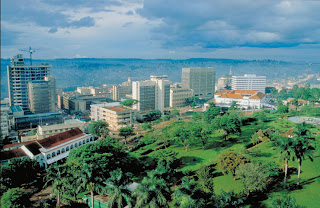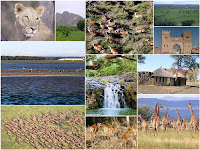Kampala
 "The history of Kampala, like that of many other cities in the world, derives from both folklore and historical fact. According to folklore, much of the area where present-day Kampala stands was dominated by wetlands and rolling hills. This made it an ideal habitat for the Impala and other members of the antelope family. They grazed on the slopes of the hills and came down to the wetlands for water.
"The history of Kampala, like that of many other cities in the world, derives from both folklore and historical fact. According to folklore, much of the area where present-day Kampala stands was dominated by wetlands and rolling hills. This made it an ideal habitat for the Impala and other members of the antelope family. They grazed on the slopes of the hills and came down to the wetlands for water.The palace of the Kabaka (king) of Buganda, located on one of the hills, overlooked this landscape rich in Impala. He turned it into his hunting grounds. Folklore merged with history when the British Empire builders arrived at the end of the 19th century. "Impala" was the English name for that particular antelope family. So the British referred to the area as the "hill of the Impala".
The Baganda, eager to adopt foreign words into the local language, translated "hill of the Impala" into Luganda as "kasozi k'Impala" (pronounced "ka Impala" and eventually "ka mpala"). So whenever the Kabaka left his palace to go to hunt his favourite game, royal courtiers would say "the Kabaka has gone to Kampala to hunt". The name stuck." Kampala Online
"Kampala is just a few miles from Lake Victoria. The town is pleasant enough, although it was damaged in recent times. It has gotten back to its feet, and is alive and kicking again. Kampala has a few interesting sights, mainly the National Museum, Lake Victoria and Kabaka's Palace. See the section about sights for more details.
These days, Kampala even has casinos, nightclubs and fancy restaurants. Ethnic restaurants are a new commodity in Kampala and now travellers can delight in cuisine such as thai, vietnamese, and ethiopian. There is a good selection of markets for african trinkets and traditional souveniers. Unlike many capital cities in Africa, Kampala is quite safe. It also serves as a major travel hub for the region." World66
More on Kampala: About Uganda.com, Safari.goAfrica, Map, Trip Advisor, Kampala Travel Guide, Wikpipedia, Picasa
Kampala on Google: News, Blogs, Video, Map
Image: africa.ata


